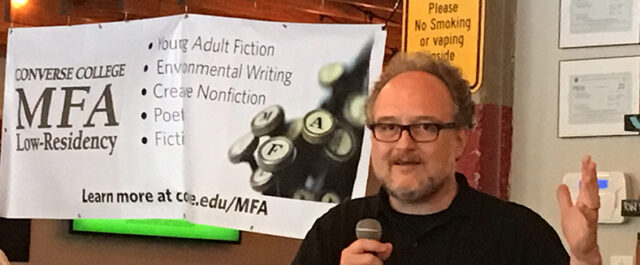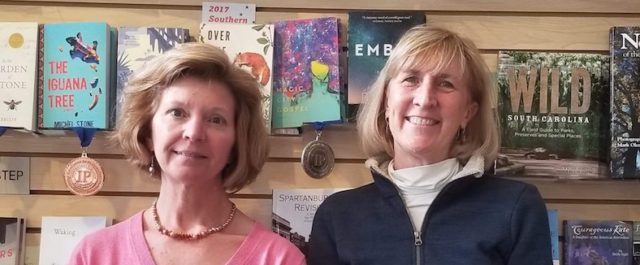By: Christine Schott
When I was an undergraduate, my fiction workshop professor banned genre writing in our class: no fantasy, no sci-fi, no romance, no detective stories. Years later, when I started teaching my own creative writing classes, and I was faced with the same decision as my former professor: do I force my undergraduates to write only literary realism, or do I open the floodgates to whatever they want to bring in?
Over the years, I’ve heard a lot of explanations for why genre writing is often banned in fiction workshops, and they are legitimate concerns expressed by people who care very much about their art. Most of these concerns, discussed below, have to do with the legitimate desire to teach the principles of good writing and avoid the habits of bad writing: the problem with these objections is that they tend to assume you can’t have good writing that’s also genre. In fact, I have come to the conclusion that banning genre writing is directly counterproductive to my aims as a teacher and as a writer.
The reason my own professor gave for banning genre writing was that she herself was not a reader of genre fiction, and so she couldn’t give us feedback that was consistent with the genre’s conventions. That was a fair point: she couldn’t give us good feedback about world-building conventions in a sci-fi piece because she didn’t read sci-fi. But one of the most powerful aspects of the writing workshop is that the professor is not the only voice in the room. That means the students can be equally valuable in critique as their teachers, particularly because each comes in with their own area of interest and, indeed, expertise. I have never had a student come to class with a piece in a genre so obscure not a single other student in the room is familiar with it. When I don’t know much about stories based on video games, I can almost guarantee that at least a couple other students know more than enough to steer our discussion. And those other students, then, are the intended audience for the story; the fact that I’m not part of that audience doesn’t mean the genre is without value.
The other main reason I’ve heard for banning genre writing is that it is poor in quality, as though subject matter determines how well one can write. A good example of this bias is Janet Burroway’s description of fantasy in her chapter “Form, Plot, and Structure” in Writing Fiction. I love everything else about Burroway’s textbook, but when I teach that chapter, I make my students read Ursula Le Guin’s defense of genre writing alongside it (https://bookviewcafe.com/blog/2012/06/18/le-guin-s-hypothesis/). Her argument breaking down the literary fiction/genre divide is a simple one: “Literature is the extant body of written art. All novels belong to it. […] Literature consists of many genres, including mystery, science fiction, fantasy, naturalism, [and] realism.” That is, genres do exist, but literary realism is one of them.
If we accept Le Guin’s premise, we don’t have to dispense with the distinction between good and bad writing, but we have to acknowledge that they are not the exclusive purview of one genre or another. Because in the end, isn’t good writing recognizable as good writing in any genre? Doesn’t a good speculative fiction author show instead of tell, use significant detail, create internal conflict, and avoid clichés? Maybe we’re describing a colony on Mars instead of a neighborhood in Charleston, but good description is good description regardless of the subject.
I think we can teach genre writing the same way we teach any kind of writing: we get our students to read books similar to what they’re working on that are well-written and innovative. When we want students to write good literary realist fiction, we don’t give them O. Henry anymore: we give them the best of Raymond Carver or Dennis Johnson. When we want students to write good fantasy, we don’t give them Christopher Paolini or Stephenie Meyer; we give them the best of Diana Wynne Jones or Susanna Clarke. It may mean we have to spend some time reading a book or two in a genre we don’t usually read, but the result is our students having models to emulate.
Fiction teachers object that there is a lot of terrible writing in genre and that their students only absorb and reproduce the tropes of their chosen genre—because, let’s face it: our students come to us having read a lot more Stephenie Meyer than Diana Wynne Jones. I don’t deny it. I only deny the implication that if we make them write literary realism, they will somehow magically become capable of avoiding tropes and clichés. Isn’t the disenchanted middle-class husband a cliché at this point too? And yet we’re still writing literary realist novels about him. I for one would rather read a clichéd story about a dragon than one about a disenchanted middle-class husband.
It’s true that my students writing their first fantasy novel or their first detective story will produce terrible stuff, full of bad writing and tropes I’ve seen a hundred times before. But they would do the exact same thing if I made them write literary realism, only they wouldn’t have any fun doing it. They’re beginning writers: they haven’t yet gained the skills or the range of experience that professionals have. And if I make them write stories about disenchanted middle-class husbands, the risk is that they will lose interest in writing and never gain either one.
My goal as a teacher is not to produce the next Nobel laureate: my goal is to produce writers who have fallen in love with telling stories and who want to improve their skills—not because I tell them that’s what they should aspire to but because they want to become the best storytellers they can. And if that means my students bring in-progress zombie novels to class, well, I’m going to try to help them write the most dazzlingly lyrical, most profoundly meaningful zombie novel that can possibly be written.

 A. J.
A. J. 

 Lisa Hase-Jackson, who has served South 85 Journal in the past as its Review Editor, brings a wealth of experience to the role of Managing Editor. She is the author of the recently published poetry collection Flint & Fire, selected by Jericho Brown for the 2019 Hilary Tham Capital Collection. Her poetry has appeared in such journals as The Midwest Quarterly, Kansas City Voices, The South Carolina Review, among others. Born in Portland, Oregon, and raised primarily in the Midwest, she has lived and taught in such cities as Seoul, Albuquerque, and Kansas City. She completed her BA at Washburn University, her MA at Kansas State University, and her MFA at Converse College. She currently lives in Charleston, South Carolina, where she edits Zingara Poetry Review, and teaches creative writing and honors courses at the College of Charleston.
Lisa Hase-Jackson, who has served South 85 Journal in the past as its Review Editor, brings a wealth of experience to the role of Managing Editor. She is the author of the recently published poetry collection Flint & Fire, selected by Jericho Brown for the 2019 Hilary Tham Capital Collection. Her poetry has appeared in such journals as The Midwest Quarterly, Kansas City Voices, The South Carolina Review, among others. Born in Portland, Oregon, and raised primarily in the Midwest, she has lived and taught in such cities as Seoul, Albuquerque, and Kansas City. She completed her BA at Washburn University, her MA at Kansas State University, and her MFA at Converse College. She currently lives in Charleston, South Carolina, where she edits Zingara Poetry Review, and teaches creative writing and honors courses at the College of Charleston.
 A native Arkansan, Anne Waters worked for twenty years in regional book publishing before taking a break to raise her son, Eli. During that time she ran an art gallery and yoga studio. She is thrilled to be back working in the world of bookselling and publishing. What she is reading: The Handmaid’s Tale (I just saw Margaret Atwood at Winter Institute); What she just finished: Jessica Handler’s The Magnetic Girl published by Hub City Press; What is next in her stack: Etaf Rum’s debut novel A Woman is No Man.
A native Arkansan, Anne Waters worked for twenty years in regional book publishing before taking a break to raise her son, Eli. During that time she ran an art gallery and yoga studio. She is thrilled to be back working in the world of bookselling and publishing. What she is reading: The Handmaid’s Tale (I just saw Margaret Atwood at Winter Institute); What she just finished: Jessica Handler’s The Magnetic Girl published by Hub City Press; What is next in her stack: Etaf Rum’s debut novel A Woman is No Man. Meg Reid is a book designer, editor and writer living in South Carolina. Her literary essays have appeared online in DIAGRAM, Oxford American, the Rumpus, and elsewhere, and she also writes extensively about design. Her MFA in Nonfiction is from University of North Carolina Wilmington, where she served as Assistant Editor of the literary magazine, Ecotone, and worked for the literary imprint Lookout Books. She currently lives in Spartanburg, South Carolina, where she is Director of Hub City Press. The most recent book she’s read and adored is Impossible Owls by Brian Phillips.
Meg Reid is a book designer, editor and writer living in South Carolina. Her literary essays have appeared online in DIAGRAM, Oxford American, the Rumpus, and elsewhere, and she also writes extensively about design. Her MFA in Nonfiction is from University of North Carolina Wilmington, where she served as Assistant Editor of the literary magazine, Ecotone, and worked for the literary imprint Lookout Books. She currently lives in Spartanburg, South Carolina, where she is Director of Hub City Press. The most recent book she’s read and adored is Impossible Owls by Brian Phillips. Katie Sherman is a journalist and an award-winning author who covers fine food and parenting—two things rarely related—in Charlotte, NC. This year, she was nominated for the Pushcart Prize. Katie has an MFA in fiction and an affinity for Southern Gothic literature, cider beer, Chicago, and morning snuggles with her two daughters. She has published extensively in literary magazines across the country. She just finished reading The Great Believers and loved it so much! Next on her nightstand is Everything Here is Beautiful.
Katie Sherman is a journalist and an award-winning author who covers fine food and parenting—two things rarely related—in Charlotte, NC. This year, she was nominated for the Pushcart Prize. Katie has an MFA in fiction and an affinity for Southern Gothic literature, cider beer, Chicago, and morning snuggles with her two daughters. She has published extensively in literary magazines across the country. She just finished reading The Great Believers and loved it so much! Next on her nightstand is Everything Here is Beautiful.